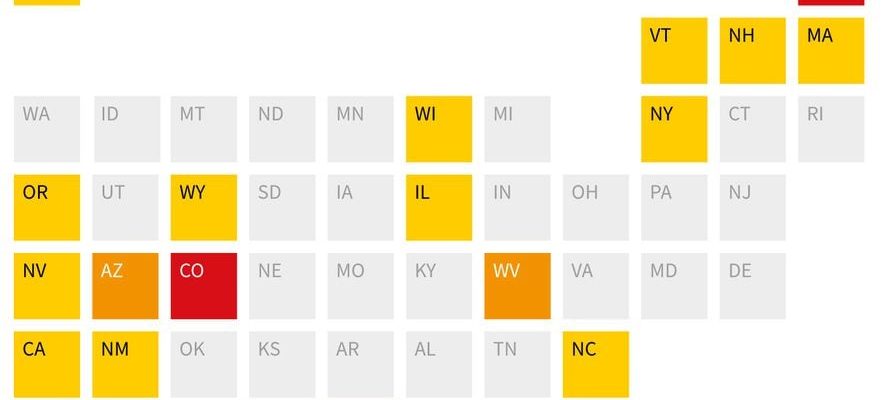Less than a year before the presidential election, Donald Trump never stops talking about him. While several federal states are trying to block his path to the White House, the Supreme Court of the United States with a conservative majority agreed on January 5 to take up the matter. And the decision is expected on February 8.
The highest judicial body in the United States was seized by Donald Trump himself. To overturn his disqualification in the Republican primaries ratified by the Colorado Supreme Court on December 19, the former president is betting on ringing the big bell, putting his fate in the hands of the wise men of the Supreme Court. “I hope to benefit from fair treatment,” Donald Trump outlined Friday evening during a speech delivered from Iowa, where the primary ball opens on January 15.
The application of the 14th amendment at the heart of the debate
At the origin of this unprecedented decision, a complaint filed by six voters from the “Centennial State” who worked hard to prevent the favorite of the Republican primaries from running in Colorado. Among them, two independents and four Republicans who joined forces with Citizens for Responsibility and Ethics in Washington (Crew), an association which has worked since 2003 to lift the veil on ethical violations and acts of corruption committed by civil servants and government institutions.
The applicants then invoke the 14th Amendment to the American Constitution. And more specifically its section number 3 which prohibits all those who have “engaged in an insurrection or rebellion” from occupying a federal position. In their complaint, they accuse Donald Trump of instigating the assault on the Capitol on January 6, 2021, considered an act of insurrection. Rejected by the former president’s camp, the qualifier was retained by the judges of the Colorado Supreme Court, who ended up declaring him ineligible.
Political or legal matter?
A verdict contrary to that rendered at first instance on November 18. The Denver court ruled that the reference to “official of the United States” in this 14th amendment “did not include the President of the United States”. Argument brandished by the cantor of “MAGA” (for Make America Great Again, campaign slogan used by Ronald Reagan during the 1980 presidential campaign and taken up by Donald Trump), and on which the Federal Supreme Court will have to decide on February 8.
The question of the possibility for a State to decree the ineligibility of a candidate in the presidential election is also at the heart of the debates. The Trump camp believes that this power is reserved only for members of Congress. In early November, the Minnesota Supreme Court ruled that courts or election officials could not prevent the Republican Party from presenting Donald Trump as a candidate for the primaries. At the same time, a judge in the state of New Hampshire also rejected a similar request based on the same reason.
But before tackling the merits, the judges must first determine whether the appeal against the participation of a candidate in the presidential election does not pose a “political question”, which would thus fall outside the judicial domain.
Around twenty states concerned
For the moment, around fifteen ineligibility actions have been initiated in other states of the country. Among which, California, Oregon, Nevada, New Mexico, Texas, Louisiana, Illinois, Massachusetts, North Carolina and South Carolina or even the State of New York, and Maryland.
List of American states in which a procedure is underway to rule on the eligibility of Donald Trump for the presidency due to his actions during the assault on the Capitol, as of December 28, 2023
© / PAZ PIZARRO / AFP
In late December, Maine Secretary of State Shenna Bellows followed suit with the Colorado Supreme Court in declaring that no ballots bearing Trump’s name would be made available to voters in her state. Enough to arouse the ire of the candidate, who appealed his decision to the Maine courts. Appeal proceedings are also underway in Arizona, Florida and West Virginia.
But the probability that these disqualification procedures will succeed remains relatively low. According to the opinion of many observers, the judgment rendered by the Colorado Supreme Court could be an exception, and thus not be taken up by judges in other states. Even more so if the Federal Supreme Court, whose architecture has changed considerably under the presidency of Donald Trump, does not agree with the candidate who continues to raise the specter of democratic denial that the maintenance of such a decision would constitute.
